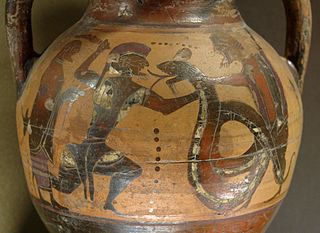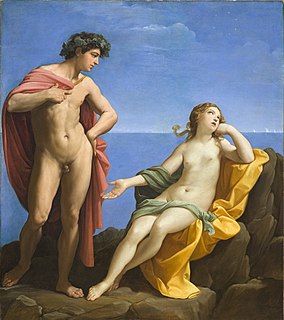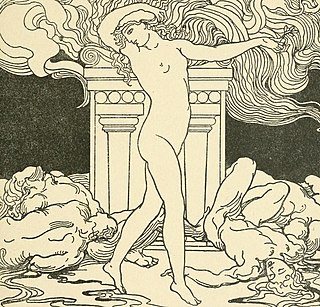 W
WTheseus was the mythical king and founder-hero of Athens. His role in history has been called "a major cultural transition, like the making of the new Olympia by Hercules." The myths surrounding Theseus—his journeys, exploits, and friends—have provided material for fiction throughout the ages.
 W
WIn Greek mythology, Aegeus was an archaic figure in the founding myth of Athens. The "goat-man" who gave his name to the Aegean Sea was, next to Poseidon, the father of Theseus, the founder of Athenian institutions and one of the kings of Athens.
 W
WIn Greek mythology, Aethra or Aithra was a daughter of King Pittheus of Troezen and the mother of Theseus and of Clymene. Aethra was also called Pittheis after her father Pittheus.
 W
WAriadne was a Cretan princess in Greek mythology. She was mostly associated with mazes and labyrinths because of her involvement in the myths of the Minotaur and Theseus. She is best known for having helped Theseus escape the Minotaur but being abandoned by him on the island of Naxos; subsequently, she became the wife of Dionysus.
 W
WFedra is an opera in three acts composed by Ildebrando Pizzetti to an Italian-language libretto which he abridged from the text of Gabriele D'Annunzio's 1909 tragedy of the same name. The play and the opera recount the story of the Greek mythological figure Phaedra and her unrequited love for her stepson Hippolytus. It premiered on 20 March 1915 at La Scala in Milan conducted by Gino Marinuzzi.
 W
WIn Classical Greek mythology, Hippolyta, or Hippolyte "was a daughter of Ares and Otrera, queen of the Amazons, and a sister of Antiope and Melanippe. She wore, as an emblem of her dignity, a girdle given to her by her father." Hippolyta figures prominently in the myths of both Heracles and Theseus. The myths about her are varied enough that they may therefore be about several different women. The name Hippolyta comes from Greek roots meaning "horse" and "let loose".
 W
WHippolytus is an Ancient Greek tragedy by Euripides, based on the myth of Hippolytus, son of Theseus. The play was first produced for the City Dionysia of Athens in 428 BC and won first prize as part of a trilogy.
 W
WIn Greek mythology, Lycomedes, also known as Lycurgus, was the most prominent king of the Dolopians in the island of Scyros near Euboea during the Trojan War.
 W
WIn Greek mythology, Phaedra was a Cretan princess. Phaedra's name derives from the Greek word φαιδρός, which meant "bright".
 W
WSynoecism or synecism, also spelled synoikism, was originally the amalgamation of villages in Ancient Greece into poleis, or city-states. Etymologically the word means "dwelling together (syn) in the same house (oikos)." Subsequently, any act of civic union between polities of any size was described by the word synoikismos. The closest analogy today is the incorporation of a city; in fact, "incorporation" is often used to translate synoikismos, in addition to the Latinized synoecism. Synoecism is opposed to Greek dioecism, the creation of independent communities within the territory of a polis.